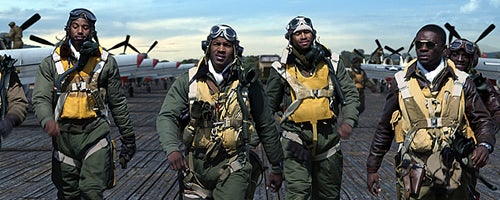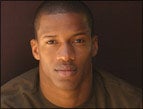Nate Parker: Faith and Courage in 'Red Tails'
Craig von Buseck: This is a story that is known, but maybe not well-known to this generation. What was it that attracted you to this particular story?
Nate Parker: The thing that attracted me to the story was what you just said, the fact that it wasn't known. We spend so much time celebrating superheroes that are fictional, and here we have the superheroes that actually lived, and breathed, and created the legacy of the Tuskegee airmen. They helped to save Europe from becoming enslaved by Hitler. I was really drawn to it because I felt like it was a page in the history books that was never added. I try my best to pick projects where I can take that page that was cast away and put it back where it belongs so that everyone can learn the history of America.
CVB: As I was looking over the film and the history of the Tuskegee airmen, it was almost like history was repeating itself. In the American Civil War, you saw the 54th Massachusetts in a similar situation where they were recruited, but were never given a chance to fight. When they did finally get into the fight, as shown in the movie 'Glory', they opened the door for all the other black soldiers who came in afterwards. Lincoln said the contribution of these black soldiers helped turn the tide of the Civil War. You see that repeated in this story. What was your thought on that?
Nate Parker: The difference between this project and the 'Glory' film, and 'Glory' is one of my favorite movies of all time, is that this film shows black leaders empowering other black men. And while 'Glory' was an incredible movie, it relied on the older structure or archetype where the white hero makes decisions and liberates and empowers the black man. So I felt that this film was a great opportunity to have this colonel who goes to the Pentagon on behalf of his men to let them know that these things that are being said about the Tuskegee Airmen are completely false. He puts his neck on the chopping board, and puts everything on the line in favor of his men. I really was drawn to that as well. It's unprecedented to see $58 million being spent making this film -- plus the money that marketing and distribution, bringing it up to nearly $100 million -- to promote a film about nine strong, masculine, black men being celebrated for their legacy of being heroes.

CVB: You play Marty "Easy" Julian, a black pilot with incredible skills and yet he was held back because of discrimination. What did you learn playing this part?
Nate Parker: I learned a lot about the human condition. To be 20 years old and to be given the responsibility of leading other 20-year-olds into war, then to lose some of those people, and to be responsible for getting the rest of them back safely on the tarmac the very next morning was a huge responsibility. It reminded me of my days in athletics; being the captain, being looked up to, being the person who is making the "life and death decisions" for the team. But in this story, these guys were really facing life and death. That pressure, that angst, and that anxiety really made him think that he needed some sort of coping mechanism. So this internal conflict led to him drinking. There are so many situations now where you see people using coping mechanisms like food, or abuse, whether it be violence or drugs. In the end he had to face that crutch of alcohol and cast it away.
CVB: In the film, your team, the Tuskegee airmen, were finally given the opportunity to go into battle and then it was a whole new ballgame. What was it like as you were shooting those battle scenes in the air? What emotions were going through your mind as you were shooting the battle scenes?
Nate Parker: Well first of all, we were in a warehouse that was painted green, on a joystick, with half a plane. Imagine how healthy your imagination would have to be, even on a simple ground level, not to mention adding on the layers of emotion and understanding of the story. It was a lot of work, because not only did we have to make it seem like we were flying for real, but we really had to sell our relationship; our brotherhood, our bond. So some of the things that were going through my head as I stack the layers of my imagination and made the environment real was, "This is life and death." We have to be excellent because anything negative will have infinitely more impact than the positive. You have to raise up the positive to a place where our skill and love for our country cannot be denied.
CVB: You look at the accomplishments of this group of fighters and you have to marvel at the doors that they opened to people like Colin Powell, who went on to be the chairman of the Joint Chiefs of Staff and then Secretary of State. As you were working on this project, how did that affect your performance?
 Nate Parker: It really reminded me that we stand on broad shoulders, and that everything that we do now is a reflection of who we were. We can't get away from our past; the good and the bad. So you have President Obama, or Colin Powell, or General Edward Rice really living through the legacy of these men. We have to also recognize that the freedoms that we have in the African-American community are as a result of these men kicking off the civil rights movement, because their work and their exploits helped bring racial integration in the military first. So the things that they did are bigger than the military. In many ways they changed the whole pallet of the country and the world.
Nate Parker: It really reminded me that we stand on broad shoulders, and that everything that we do now is a reflection of who we were. We can't get away from our past; the good and the bad. So you have President Obama, or Colin Powell, or General Edward Rice really living through the legacy of these men. We have to also recognize that the freedoms that we have in the African-American community are as a result of these men kicking off the civil rights movement, because their work and their exploits helped bring racial integration in the military first. So the things that they did are bigger than the military. In many ways they changed the whole pallet of the country and the world.
CVB: That really is true. Much of what came in the next two and three decades in the civil rights movement were as a result of these men who had gone to war to fight for freedom and democracy, then came back home and found that these freedoms were not being given to them in reality here at home.
Nate Parker: That's right and yet they still fought. It's funny because one of the things I heard a lot was that when the Black airmen would get captured by the Germans, the Nazis would ask them, "Why are you fighting for a country that hates you this way?" In Europe they just could not understand it. But that's not too different from being in Paris and talking to a couple of Frenchmen and having them say, "How can Americans elect a black president when your country is so racist?" So something like this serves to empower the American brand. It opens a dialogue.
So what is the prequel to the Tuskegee Airmen? What is the sequel to the Tuskegee Airmen? What did they go on to do afterwards? There were soldiers who came back after World War II who were lynched in their uniform. Dr. Roscoe Brown, who was one of the original Tuskegee airmen, said when they got back to America on the boat, they walked down the off ramp and there was a guy with a sign saying white people this way, colored people that way. He thought to himself, "Were back in the good old USA." So these feelings run very deep.
But this film is medicine. It's healing for the airmen. There is scarring and trauma that goes along with a person giving your life for a country that doesn't recognize you. But then President Bush gave them the Congressional Gold Medal. Then to have a film that immortalizes what you did, and to have George Lucas and the resources that he provides be a conduit for that, I think it is really an important step in the entertainment business, and a step for our country moving forward.
CVB: You bring up George Lucas. This is the first live action film that he's been involved in that is not sci-fi since the Indiana Jones movie. What kind of interaction did you have with him? What do you think it was that drew him to this particular project?
Nate Parker: George Lucas was very present on this project. He was there a lot. He was very specific about what he wanted. He collaborated with the director a lot. Seeing them both on set was inspiring in itself. I think one of the things that attracted him was that he thought the story needed to be told. And he was obsessed with the dogfights of World War II. When you look at the trench battles in "The Empire Strikes Back", you'll see that those fights were inspired by the dogfights of the Tuskegee Airmen. So I think that he had a passion for the story for a long time, for the entertainment value especially. But I also think that the historical context was just something that he understood and was patriotic in sharing.
Read Craig's review of 'Red Tails'
Read Craig's previous interview with Nate Parker: Civil Rights: How Far Have We Come?
Learn more at NateParker.com
More ChurchWatch
More Church and Ministry
More from Spiritual Life
Meet a Christian a Friend on My.CBN
More from Craig on CBN.com
Order Craig's new book by Regal Publishers, Praying the News, co-written by CBN News anchor Wendy Griffith.
Order Craig's books on ShopCBN: